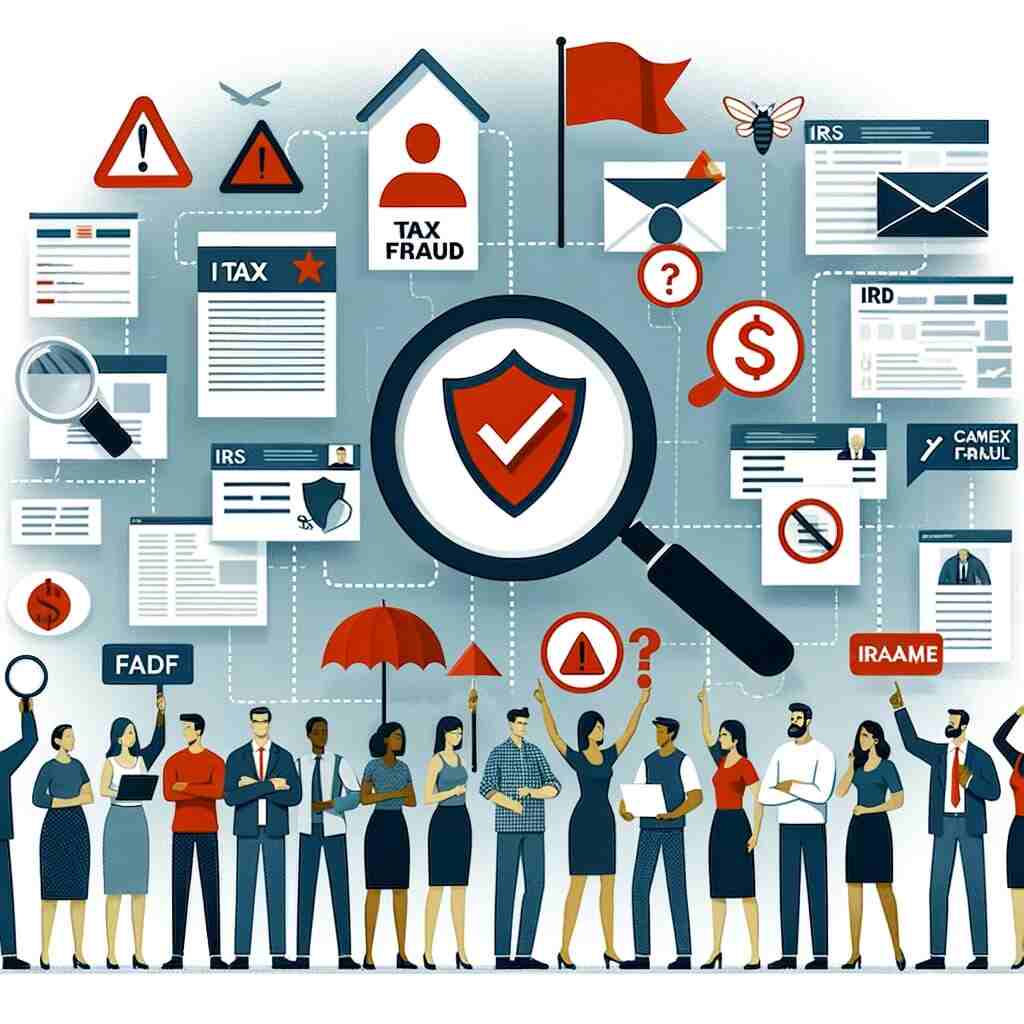Last Updated on 05/15/2024 by Christian Collins
As tax season approaches, so does the risk of falling victim to tax fraud schemes. These schemes come in various forms and can lead to financial loss and legal troubles. To protect your finances and personal information, it’s crucial to understand the common tax fraud schemes, recognize their red flags, and learn how to avoid them. Here, we’ll explore these schemes and offer guidance on safeguarding your financial well-being.
Recognizing Common Tax Fraud Schemes
Understanding the most prevalent tax fraud schemes is the first step to avoiding them. Here are some of the most common tax fraud schemes:
-
Phishing Scams:
Phishing scams involve fraudulent emails or messages that impersonate the IRS or other tax authorities. They typically request sensitive information like Social Security numbers or financial details.
-
Identity Theft:
Identity theft occurs when someone steals your personal information to file a fraudulent tax return in your name and claim a refund.
-
Tax Preparer Fraud:
Some unscrupulous tax preparers may engage in fraudulent activities, such as inflating deductions, to boost your refund, but this can lead to legal troubles.
-
Ghost Preparers:
Ghost preparers are individuals who offer tax preparation services but are not registered or certified. They may disappear after filing your return.
-
Phony Charities:
Bogus charities may use tax season to solicit donations. Be cautious when donating, as these organizations may not be legitimate.
-
Offshore Tax Evasion:
Some individuals hide money in offshore accounts to evade taxes. The IRS has been cracking down on offshore tax evasion.
How to Spot Red Flags
To avoid falling victim to tax fraud schemes, you need to be vigilant and spot red flags:
-
Unsolicited Communication:
Be cautious of unsolicited emails, phone calls, or messages claiming to be from the IRS. The IRS typically initiates contact through regular mail.
-
Unusual Refund Promises:
Avoid tax preparers who promise unusually large refunds, as they may be inflating deductions or engaging in fraudulent activities.
-
Unregistered Tax Preparers:
Ensure your tax preparer is registered and certified. Check their qualifications and reputation.
-
Lack of Transparency:
Ghost preparers may not provide a clear and complete copy of your tax return or refuse to sign it.
-
Pressure to Donate:
Don’t feel pressured to donate to charities without researching their legitimacy. Verify their tax-exempt status with the IRS.
-
Offshore Account Claims:
Be wary of anyone offering to hide your money in offshore accounts to reduce taxes. This is illegal and can lead to severe consequences.
How to Avoid Tax Fraud Schemes
Avoiding tax fraud schemes requires a proactive approach:
-
Verify Tax Preparers:
Check the qualifications and registration of your tax preparer. Look for certified professionals with a good reputation.
-
Protect Your Personal Information:
Never share your personal or financial information via email, phone, or text. The IRS does not initiate contact in these ways.
-
Use Strong Passwords:
Protect your online accounts with strong, unique passwords to prevent identity theft.
-
Be Cautious with Donations:
Research charities before donating and ensure they are legitimate organizations.
-
Stay Informed:
Stay updated on common tax fraud schemes and IRS alerts. Awareness is your best defense.
-
Secure Your Financial Information:
Safeguard your financial information, such as tax returns and financial statements, in a secure and encrypted manner.
Reporting Suspected Fraud
If you suspect you’ve encountered a tax fraud scheme or been targeted by one, it’s crucial to report it:
-
IRS Impersonation Scams:
If you receive an unsolicited email or message claiming to be from the IRS, report it to the IRS at phishing@irs.gov.
-
Identity Theft:
If you believe your identity has been stolen for tax fraud, report it to the IRS and the Federal Trade Commission (FTC).
-
Report Phony Charities:
If you suspect a charity is fraudulent, report it to the IRS through the Exempt Organizations Select Check tool.
The Consequences of Falling Victim
The consequences of falling victim to tax fraud schemes can be severe, including financial loss, identity theft, and legal troubles:
-
Financial Loss:
You may lose money through inflated fees, bogus refunds, or unauthorized transactions.
-
Identity Theft:
Identity theft can lead to a multitude of problems, including fraudulent accounts and credit damage.
-
Legal Troubles:
Participating in fraudulent activities, even unknowingly, can lead to legal issues and penalties.
Conclusion
Tax fraud schemes are a significant threat during tax season, but with knowledge and vigilance, you can protect yourself from falling victim. Understanding common schemes, recognizing red flags, and adopting proactive measures to avoid them are key to safeguarding your financial well-being. If you encounter or suspect tax fraud, report it promptly to the relevant authorities to help prevent others from becoming victims. Remember, protecting your finances and personal information is a responsibility worth taking seriously.

